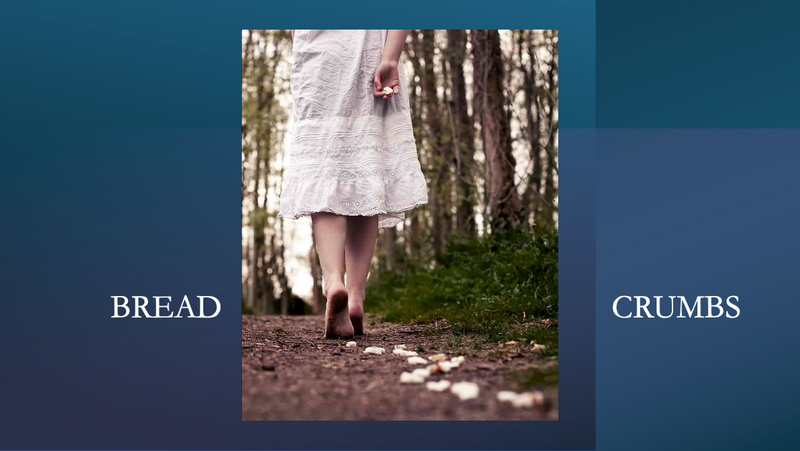
- 18 clues on the path to a meaningful, exciting life
- From the mundane to the profound
- With frequent interruptions for laughter~
- A memoirish guidebook
- by Ann Medlock
- If/when there is a commercial version of this,
- there will be illustrations abounding.
- For now, I’m just leaving the words here,
- without chasing down the rights to all those images,
- some of them quite wonderful.
- I doubt, however, that there will be another version.
- When this was read by NY editors,
- I was advised to re-write it either as
- Humor, Philosophy, Advice, How To, or Memoir.
- It can’t be all of the above.
- I’m not interested in making it something it's not
- so here it is, as is—
- a genre-busting mélange that might need a new name. How about:
- All Of The Above—Like Life, Y'know?
- 🌀🌀🌀🌀🌀🌀🌀🌀🌀🌀🌀🌀🌀🌀🌀🌀🌀🌀🌀🌀🌀🌀🌀🌀🌀🌀🌀🌀🌀🌀🌀🌀🌀🌀🌀🌀🌀🌀🌀🌀🌀🌀🌀🌀🌀🌀🌀🌀🌀🌀🌀🌀🌀
Dear Reader,
If you’re old enough to be an elder and are encountering younger people assuming you can/should/will advise them, you may find some useful material here. If you’re young, you may not have an elder in your network who can annoy you with advice. An in-between age and still figuring out your own way forward? There may be things here that confirm or challenge your choices.
I’m here to help.
As an octogenarian, I know Father Time and Mother Nature are on my tail. That’s normal. Add a roaring pandemic that’s killing oldsters in huge numbers, and it’s definitely a moment to think “legacy.” As grandchildren become full-size people, graduating from school, launching careers, and adding to the head count of the clan, what should the mater familias—that would be me—say to them before she exits?
It might be wiser to say nothing. There’s a risk of being Polonius, an old fart full of laughable platitudes. It’s especially awkward because I hate to read second-person instructions. Whenever a writer presumes to tell me what I should do, my brat instincts kick in and I walk away. The only “you” writing I can stand is by Marcus Aurelias because he was talking to himself. That I can handle.
When talking to myself about the years, so far, it’s clear that I lost way too much time trying to be what was expected of me rather than who I am. I came to life—in all the meanings of that phrase—at around 50, for a lot of reasons you’d have to read my roman à clef to know. Fifty’s better than never and, fortunately, I don’t drive looking in the rear-view mirror—the regrets would be too debilitating when there’s so much to do, to finish, after that late start. So this is about younger lives, lives that shouldn’t lose decades, as I did.
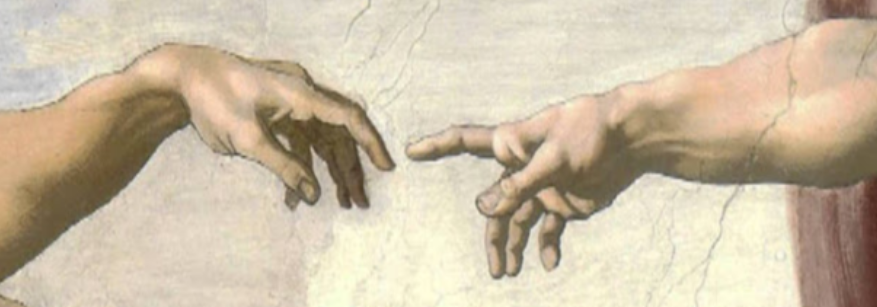
“Draw, Antonio, draw, Antonio, draw and do not waste time.”—Michelangelo’s last words, spoken to his assistant.
You, Dear Reader, whatever age you are, are invited to listen in, so to speak, as I give the young in my world hints, clues, flashes about matters mundane and possibly profound. The mundane I’m pretty sure I’ve figured out, the profound I’m still working on. If you share my resistance to authority, look at these advisories as messages I wrote for my young kin, not you. You’ve already figured out how to live your life, right?
That said, do read on, and then let me know what your own Operating System is. I’d really like to know. Here’s what I’m telling my family about mine…
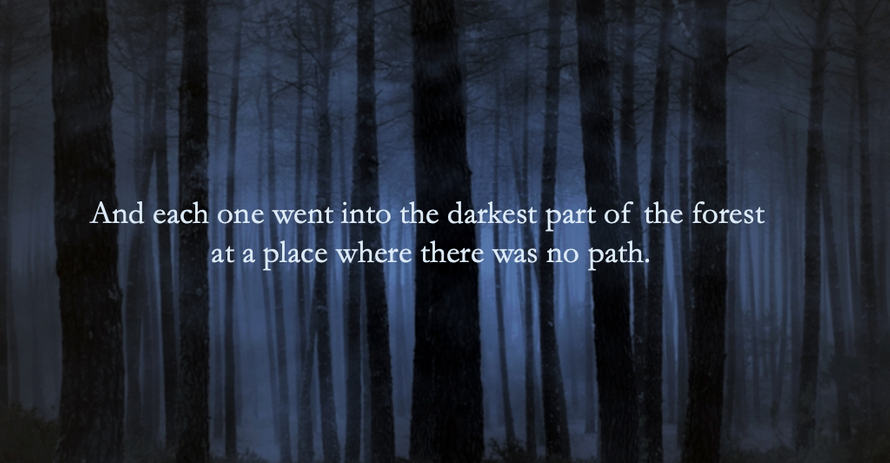
Dear Kiddo,
I want you to know everything I know, to have all the guidance that has kept me aspiring to do better, even now, as I deal with the astonishing fact that I’m pushing 90. The urge to make everything go smoothly for you is strong. And stupid on my part. You’ll handle whatever life deals you, and you’ll do that well or badly. Decades of living, of making choices, are ahead of you. According to The Rules of the hero's journey, you're on your own––you have to make a new path where there is none. But that can be confusing and scary, so a few clues, to help you find your way, couldn’t hurt, right? Right?
🌀🌀🌀🌀🌀🌀🌀🌀🌀🌀🌀🌀🌀🌀🌀🌀🌀🌀🌀🌀🌀🌀🌀🌀🌀🌀🌀🌀🌀🌀🌀🌀🌀🌀🌀🌀🌀🌀🌀
Bread Crumb 1 ~ The Golden Rule isn’t good enough.
Yeah, let’s start with a bang. The Golden Rule is touted in religions all over the world, and by humanists, all of them looking for the right guidelines for living. Smart people, ethical people, have called it the most basic of operating values, the Prime Directive, if you will. And this smartass is quite sure that it falls short.
“Do unto others as you would have them do unto you.”
I see self-protection inherent in those words, and that really bothers me. I’d rather you not do anything unto anyone for fear or expectation of what they’ll do back unto you, or for you.
There’s also a projection problem. Logically, it fails to make the world the least bit better when, for instance, people are masochists and what they want from others is to be hurt. Following the Golden Rule would mean that hurting people is the right action for masochists, because that’s what they want done to themselves. For misanthropes, who want to be left the hell alone, the Rule gives them validation for ignoring other people because that’s what they want you to do unto them.
Nope. Not good enough.
Consider, if you will, the Platinum Rule—
“Do whatever you can do for your fellow beings.”
Just that. Full stop. See what I did there? The loop back to self is gone. So is the loony-desires problem. Any skills you have, any goods you can offer, just get on out there and be of service. That should be the Prime Directive.
Life can be hard and we need to help each other get through the rough spots. I’ve been writing about people sticking their necks out for the common good for over 40 years. I choose to see in them the Platinum Rule.
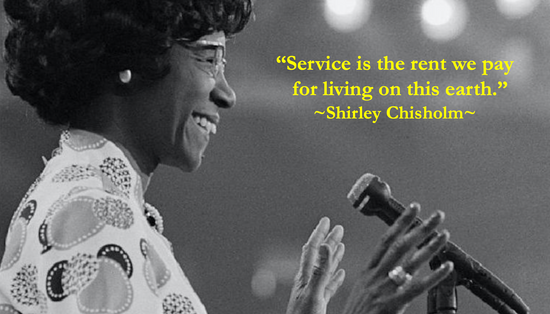
2 ~ Brace yourself—Being alive is a risk.
For all those decades, I’ve been writing about Giraffe Heroes, people who stick their necks out for the common good. The risks they take have inspired the hell out of me, so maybe they’ll inspire you to look beyond the safest way forward and take some risks. There’s a lot to be said for deliberately getting into the “good trouble” Congressman John Lewis favored.
I’m leaving you (and the world) an online database of over a thousand stories of people doing just that, exemplars of lives well lived. Their stories are waiting for you here.
Do follow their lead. Seeking security nails most people into coffins while they’re still alive. It’s better to laugh on the tightrope than to cower on the platform, demanding a net before you’ll step onto the rope. Security is the womb and, if we’re very lucky, it’s also our parents’ arms. Out here, on our own, we’re all at risk, all the time.
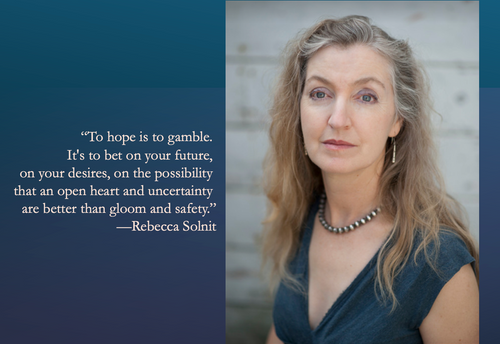
It’s probably a good thing that there’s no such thing as security, because adrenaline doesn’t happen when you’re totally safe, and adrenaline is pretty useful stuff for getting things done.
I’m not one of those people who take risks for the hell of it. It’s got to mean something or I’d rather settle into a comfy chair and read a good book, thank you very much. But if it’s for a cause I believe in, people I love, work I want to complete—hold my beer.
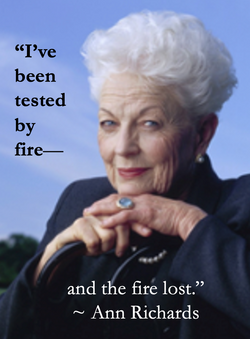
If you hone your skills so you’re resilient and can count on yourself—you’ll be upping the odds that the risks in your life won’t do you in. But no matter how prepared and purposeful you are, you can still be knocked off your pins. Fate doesn’t deal in guarantees. That’s why resilience and self-reliance are crucial.
If/when you’re flattened by an unexpected gale wind, you’ll know that you can get yourself back together, then get up, dust off, and carry on.
If/when you decide to make a risky move, you can be a little more confident that you can pull it off.
There’s a choice to be made between Get By or Fly. If you’re fine with getting by, this old woman’s ideas of living with—hell, flying with—uncertainty, may not be for you.
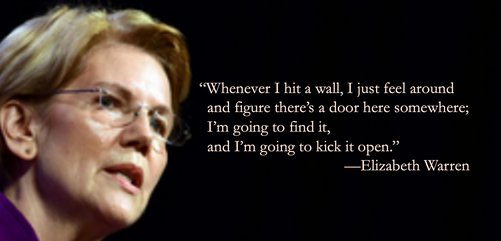
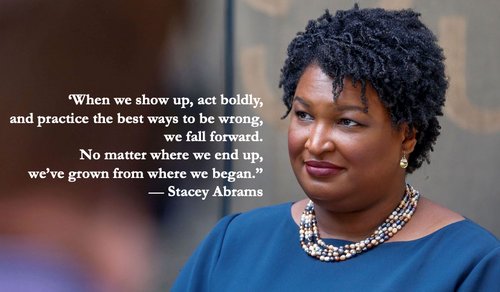
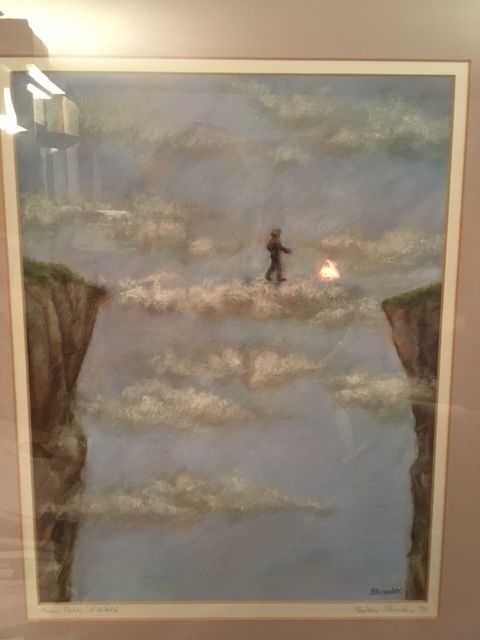
3 ~ You can improvise a good life.
Perhaps the biggest operational thing I know from my own life is that the good parts have been one long improvisation. The basics of improv performances include never saying No to what’s tossed at you. First response has to be: Yes and… Then you move the narrative forward. No matter how startling the line or the situation that’s handed to you may be, whether the surprise is good or bad, you accept it and run with it.
I see that as a manifestation of the philosophy of life delineated by Aurelius and his fellow Stoics, thousands of years ago. Since then named amor fati (loving your fate) it’s basically about saying Yes and then making your move. Improv.
The Stoics said you should put up no resistance to accepting and learning from whatever lands on you, good or bad. The common response to the bad stuff is “Why me?” It’s a dumb question when addressed to Fate, the Force, God, whatever name you want to put on what’s going on behind what we can see. Rather than wallowing in aggrieved, pointless questioning, the Stoics say Take it and run with it. Given the abilities, talents and resources you have, make the best move you can. Wherever that puts you, take your next shot from there. Play it as it lays.
Don’t be derailed by the current usage of “stoic.” It isn’t about being emotionless and passive, as the word is now used. The name for the philosophy came from stoa, which was the word for the covered, columned place along the front of a building in Athens where a guy named Zeno expounded on his theories of how things work, becoming known at the first Stoic, because of the place he held forth from. “Stoic” didn’t mean Zeno, the First Emotionless, Passive Blank.
Marcus Aurelius was a winning general and an effective emperor—not jobs you can do passively. He told himself that Life will throw you one unexpected pitch after another. Some will be nice fat changeups you can hit outta the park. Some will be nasty curve balls. Doesn’t matter. You’re at bat. Go for it. OK, Aurelius didn’t really use baseball images, but you get what I mean.
When the incoming change is really bad news, the amor part is hard. I’m pretty good at acceptance and next shots, but I still yell Crap! and WTH? before I get there. And some plot twists are just too hard to love immediately, if ever.
Life goal I’m still working on: Instant acceptance, with no swearing.
Life goal I’ll probably never reach: Instant loving, along with the acceptance.
I did a lot of improv living instinctively but didn’t really think about it until I worked with Christopher Alexander, building the wonderfully sheltering house where I’m writing this, waiting out the pandemic.
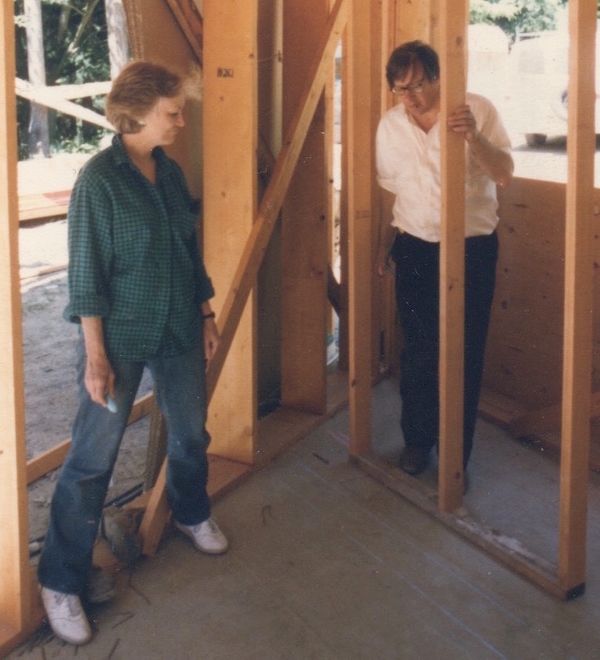
If that name’s not familiar to you, do look him up, because he’s a BFD. He’s an architect, a master builder, a professor, a polymath, and the writer of many, many books. He’s the reason this house is the miraculous place it is and why I’ve threatened formally, in my will, to haunt any descendant who might try to make it “marketable,” as in painting it all white and putting in gold-plated faucets and marble counters. You’ve been warned.
As soon as I finish this piece, I’ll go back to working on Building with Christopher Alexander, An Illustrated Memoir. There are shelves of books by and about him, but no one’s written about the experience of building a house with him, partly because it’s so rare that he did private houses. I’ll get that done, but for now, just these notes on his improvisations…
- A sad note here:
- Chris died just after I finished writing this, in his beloved Sussex.
- I should change to past tense but just can’t.
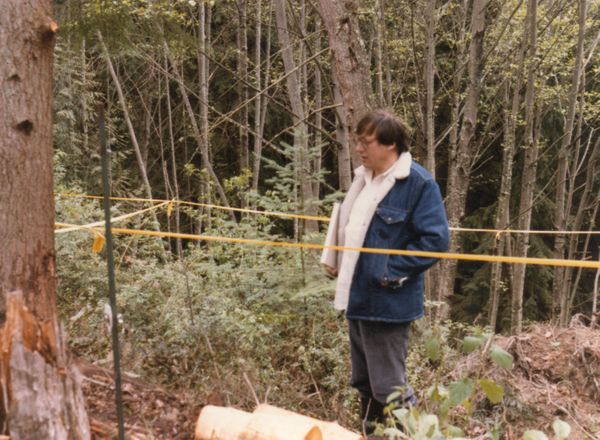
Chris, on site, supervising construction in Master Builder style, decided everything in the moment, considering the givens at hand, including whatever surprises the process pitched him. He’d take in the odd shape of the land, a change in the materials available, an unexpected movement of the light, a realization that JAG was too tall for a space that was taking shape—each factor, each surprise, was absorbed, and he’d make his move. Like when he got an anguished call from a lumberyard offering a great deal on a huge order of cedar that had just been cancelled. OK, we’ll do cedar inside the house as well as outside. Or, the building regulations require double-glass window panes. OK, we go to fewer panes so the windows are affordable.
Each move he made created new givens, and he’d work from them to decide what to do next. Not without angst, I must add. He met many a change with considerable drama. Then he’d get on with it.
When we talked about his improv approach and why I was sure we couldn’t build a house that way without him, he said, “Well, of course you also have to know what you’re doing.”
Of course. Scales before jazz. You can’t just pick up a horn and expect to play Sketches of Spain. First the scales, the classes, the sketchbooks, the nights of study. Practice practice practice. Picasso could draw like an Old Master before he went full rogue.
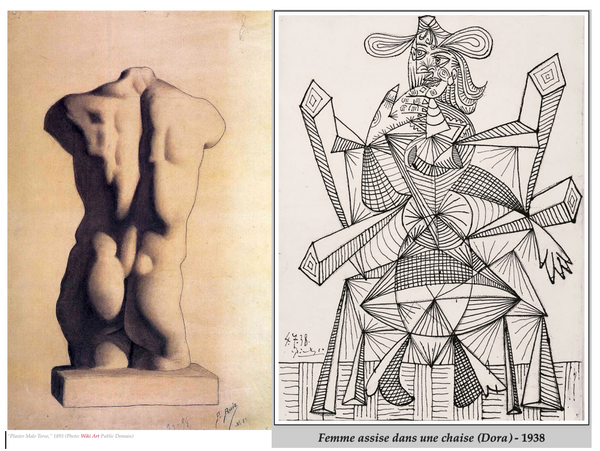
Watching Chris proceed to solve each day’s challenges, with each solution leading to whatever the end result was to be, I realized that, in my own work, I didn’t need to know the conclusion of the story, the last line of the poem. I needed to work with what I had in the moment, just taking the natural next step. I didn’t have to be stalled, not writing at all because I didn’t have the end figured out. I could just go, driving to the end of my headlights.
If you keep doing that, you’ll get there, wherever “there” needs to be. Watching a whole building come into being that way was a revelation.
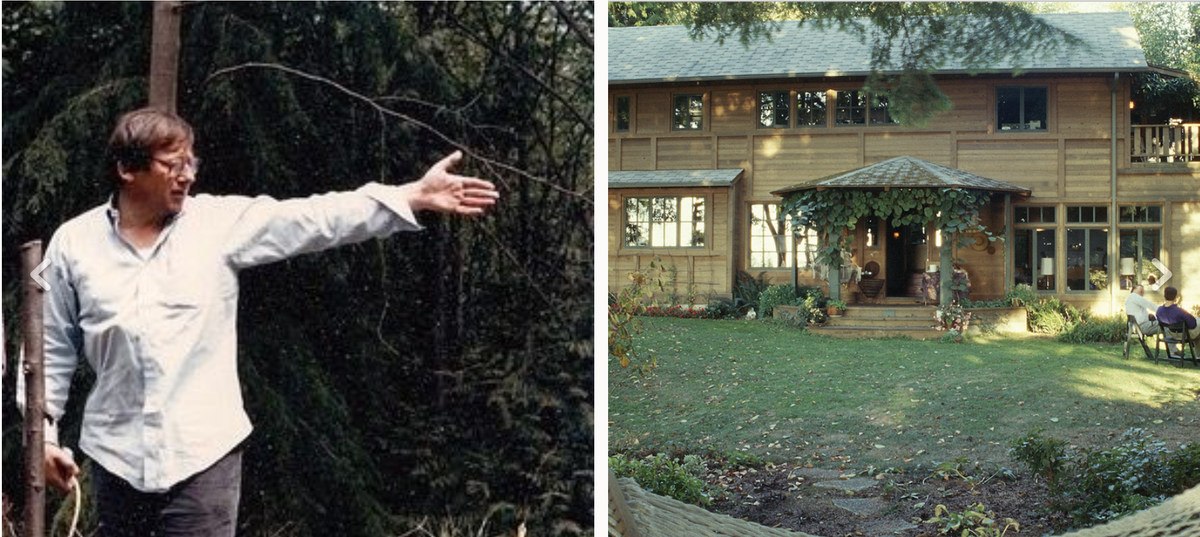
My writing became listening to the words in my head that won’t shut up, considering the images that won’t stop appearing. Those are my “givens.” In the realm of life-decisions, I take in what’s coming at me, and do my best to welcome it. I consider all the givens at hand and—even without getting to amor—I create my next move.
Making it up, day after day, means being fully engaged, awake and observant, aka alive. The life you create from millions of such moments is vivid and exciting, just as the house Chris built for us is resoundingly alive.
If you require certainty, you’ll need A Plan, A Rulebook, Guidelines, and maybe — Commandments. It’s comforting to be given a playbook that means everything is all figured out—just do what is Written.
That also means you’re taking something figured out by fallible humans who were trying to make sense of life, and accepting their guesses as your marching orders. We humans are wonderfully creative beings. Faced with a mystery, we move into creativity and/or faith to fill the void, coming up with marvelous stories about what’s going on, but…we’re guessing.
In, I suspect, an effort to head off people who see things this way, the Roman Catholic Church declared their leader infallible on matters of faith. Makes me smile. Suuuure he is. The church leaders recognized the problem of people saying “Hey, he’s just a guy trying to figure stuff out, like a lot of us.” It’s hard to run an institution without laying down some ground rules. Nice try, fellas.
If you do accept someone’s guesses as your instructions for living, you never have to improvise; you can just do what The Book says. For me, that’s a formula for sleepwalking through life, getting by. I’d rather fly.
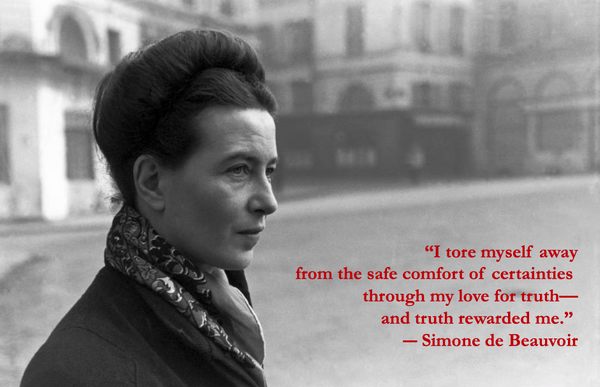
It works with the really small stuff too.
Take getting dressed in the morning. Some people have set “outfits” they’ve been told are suitable. I consider the givens—the weather, the schedule, the mood of the moment, and choose a shirt, a pair of pants, a scarf, earrings… It’s never the same assemblage as any other day. Cooking. My recipe for almost everything is, What’ve We Got? Let’s see. Here’s a lemon, there’s rice in the fridge, cod in the freezer, thyme in the garden… a meal develops. I design knitted things, and during this pandemic, face masks. Each one comes into form from a lot of what’s-available/possible choices—I don’t follow written patterns.

Clearly, my advice is—Get the basics down, then wing it!
4 ~ Freud got two out of the three Most Important Things.
When he was asked what people need to be happy, he said, “Love and work.” He forgot Home, says this home-lover, but let’s start with Love. Not the love you give or get from family or your friends. I mean the One + One kind.
Choosing a person to share your life is a subject that’s filled volumes over the ages, but you might consider a few ideas from someone who’s gotten it wrong, repeatedly. Boy, have I gotten it wrong. Until I didn’t. Like a lot of very young people, young me mostly fell for people who were good to look at. “Jerry,” the handsomest guy in my class, three years older than the rest of us, he’d flunked so many times. “Nick,” tall, dark and dumber. Spouse One, handsomest of all and constantly two beats behind on understanding what was going on, if/when he ever did.
There’s not much long-term value in eye candy. So I switched to Smart. Spouse Two was blazing bright—and a narcissistic sociopath who used everyone he encountered to serve his own unrevealed ends. Wrong again, girl. So wrong I wrote an entire roman à clef about it that can give you the details, if you haven’t read it yet. (And if you haven’t, what’s that about?)
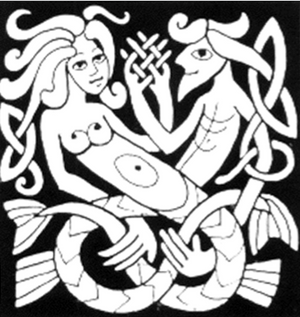
Spouse Three is the keeper. After almost 40 years of an alliance that works, I can say to you—Kid, I hope you pair up with someone you can talk to, plan with, an honest, discerning witness whose feedback helps you course-correct, who can be your harbor and your solace in hard times, who can work with you on your goals and on the ones you share, laugh and cry with you, be your frame when you wobble.
- FRAME
- “Gentlemen, set your frames.
- This here dance starts simple
- and gets tricky real fast.
- Your lady cannot do
- the necessary turns and
- flourishes if you do not
- give her frame.
- But if you got
- steady shoulders,
- rock-strong arms,
- sure footing,
- then there she goes,
- twirling, double-timing,
- knowing she can count on you
- for balance. Give way
- when she swings out,
- when she’s off balance—
- her spin will take her down.
- Then you got one bruised and
- limping little lady, don’t you know?”
- You ask what I need from you
- as I rescript my life, ending what
- I thought it was and spinning into
- what it may really be. No actions,
- no words are needed, only frame,
- only the pinpoint touch of your
- solid presence, only the still point
- without which there is no dance,
- and we know there is only the dance.
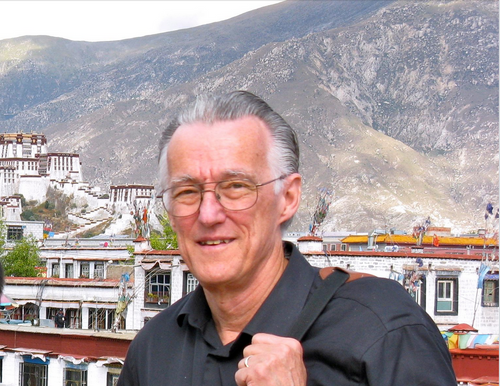
- JAG, who gives great frame
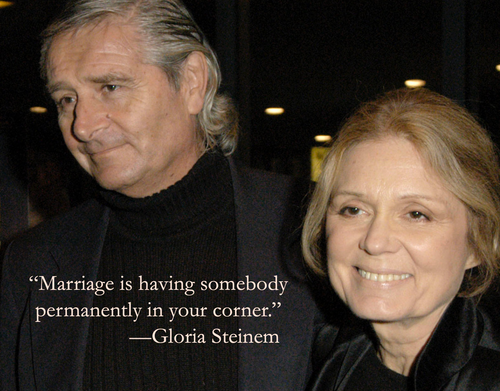
Yes, you read that right. Steinem, who married for the first and only time when she was 66. (He was a mere 59. And JAG is nine years younger than I am. Steinem and I may be onto something.)
I don’t know of a couple who never hit serious snags, but if you’re in a real partnership, working through them is worth the time and effort.
What about soloing? I have a lot of friends who never married, who never found the person they could have a true partnership with—and didn’t make the mistake of marrying the wrong person, as I kept doing.
We’re all old now. I have children I like a lot from those wrong choices and from Spouse Three’s own earlier wrong choice. Most of those children have children who are really good people, and we all have each other’s backs. It’s worked out pretty well.
You may like the idea of a free-of-ties, independent life, or you may not find anyone who would be the right partner, even if you’d like to have one. Loving friends and family can make all the difference. They can have your back big-time, both emotionally and in simply showing up when something needs to get done that you can’t do alone. Families rock, including those we create by choice; the love that circulates in them is life-sustaining.
As to work, if you’re really lucky, what you do well and should pursue was something that was clear early in your life and you were encouraged to go further, exploring that possibility.
Me, I was the kid who got in trouble at home when the kindergarten teacher, shaking her head, told my mom I was quite a storyteller. To Mom, that mean Liar and she was pretty mad at me. It was eventually sorted out that I was taking over the class to tell the kids stories. Not lies. Stories. This was not encouraged. Not by teachers who seemed to want control of their classrooms. Not by parents who saw no possible value in such an ability.
I hope what you do well has already been noted and encouraged. Maybe you were the kid who could talk anybody into anything, play any music you heard, or understand how objects work, taking them apart and putting them back together. There are jobs that go with such innate skills and interests. Please don’t turn away from those clues toward something in a totally different lane, one that doesn’t really matter to you, but pays well.
- “Not he [sic] who has little, but he [sic] who desires much is poor.”~Seneca~
- (Another Stoic. They keep popping up.)
One way to be free to pursue work you care about is to keep your expenses small. Put the focus on what you need, not on what you may just want. I thought I needed Manhattan and my view of Central Park and the midtown skyline. But when doing the work I love meant finding someplace cheaper, I got what I needed—a solid, quiet place from which to transmit that work. And waddya know, I don’t seem to be suffering at all, having given up one fabulous place to find another. (On a clearer day, you can see the mountains and the sea from the window on the right, the Olympics and the Salish.)

You can do end runs that get your wants handled, on the cheap. That’s worked out pretty well for this person who hates waste but loves luxury. As in, I deal with wanting nice clothes by being an astute thrifter; I don’t need a high-paying job so I can buy at posh shops. Have you looked in my closet? It’s awesome.

That said, it’s important to know the difference between pleasure and joy. Don’t assume material things can/will make you really happy. Lots of things give pleasure. Momentarily and addictively. The happy fix wears off and we need the next hit to get back to the good feeling. Having 37 white sweaters is a sure sign of addiction. [I'll link to a piece about that, soon.]
But joy—joy nourishes and sustains. Joy is doing your work, taking life’s turns with grace, being fully present, here, now, in every wonder-filled moment ahead of you.
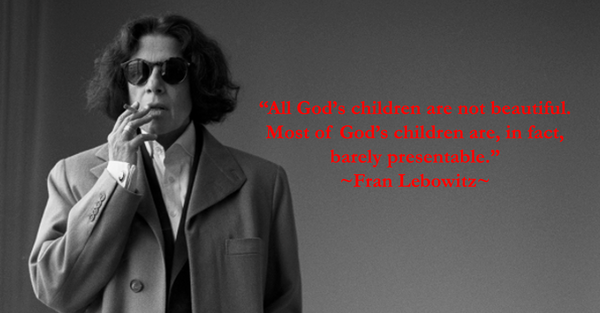
And while we’re on this matter of joy, there are limits to the hit you get from looking good. This family is full of beautiful, handsome people. In both love and work, looks can be weaponized. So OK, use that, you fine-looking human. I sure have. Moving through the world can be hard—looking good has helped me again and again. With this guy’s genes in so many of us, it’s hard to be “barely presentable.”
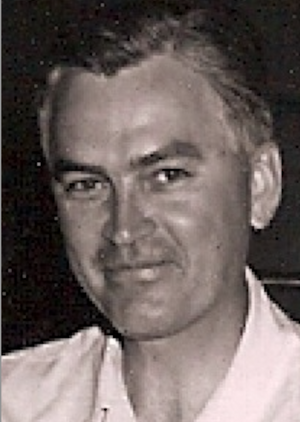
But your value to yourself shouldn’t be based on that measure. If you let it define you, then a bad hair day or new wrinkles will throw you off course when it shouldn’t have any bearing on what you need to do.
The best lesson I ever got on that one came when I arrived at a photo studio in California to sit for a headshot. It was a few days after Elizabeth Taylor’s first wedding and the photographer had been her official shooter. Everything was covered with images of her—tables, chairs, walls… and you could only stare in wonder. Taylor at 19 was other-worldly gorgeous. She was rich. She was famous. She had work and—she thought—love. And the photographer told me that when he was clicking away as she finished dressing, she burst into tears. She had looked into a white satin shoe and seen “7 1/2.” The “imperfection” of feet she considered too large made her cry. This woman. Don’t ever do that to yourself!

Factor Three in being happy, the one Freud missed—Find home and secure it, if you possibly can. We managed it, despite doing work that pays at poverty level by the standards of the “success”-driven USA. It took living frugally, and socking every spare dollar into paying off the mortgage. I’m writing in the eleventh pandemic month of sheltering in place, of being grateful for shelter that’s not owned by a bank, that can’t be taken away as the economy dumps people onto the streets after foreclosures and failures to pay rent.
You, kid, may be a free-floating spirit with no need of a home base—if so, good on ya. But if you got any of my home-loving genes, it will be good to work toward having a place where you can moor in whatever storms may come. If that’s not a house, apartment, cabin, camper, or yurt now, at least get a room of your own, a place you can make messes, play your music loud, dance, paint the walls any damn color you like, and never clean up. Unless you feel like it.
5 ~ A constant refrain I sing—Don’t buy in.
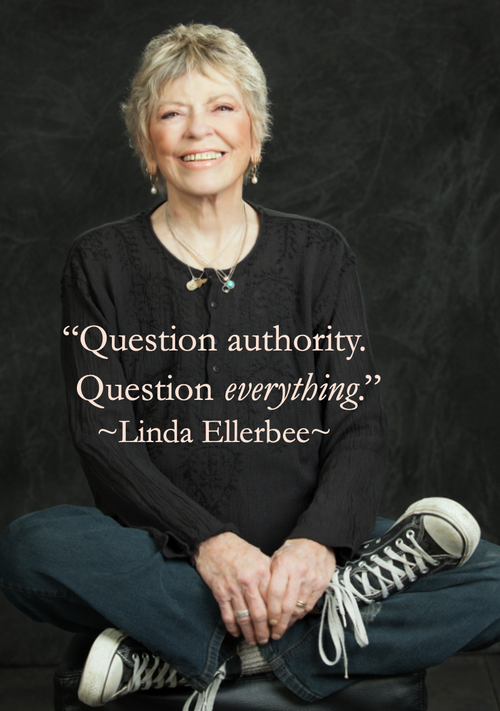
Question Authority was a 60s battle cry adapted from Socrates, another of those philosophers who figured out so much, so long ago. I’ve given away a lot of Question Authority buttons, and stood with a son when wearing one of them got him called on the carpet by an outraged teacher. Questioning Everything was a fine update by the great Linda Ellerbee, who gleefully spread the idea to America’s children via her Nick News show.
After being fired from all the networks for her wonderfully disruptive presence as a news anchor, she brought the news to the nation’s kids for 23 years. We had a good laugh about that when I worked with her on developing a show for kids about Giraffe Heroes, people who do a lot of questioning the powers-that-be. She said far and wide “My goal was never a nation of kid news junkies. I am more subversive; I wanted to grow a nation of rowdy citizens.” Good Trouble. Yeah!
Questioning is essential for the day-to-day operational principle of not buying in. As already noted here, people, and the culture at large, are full of ideas that are waved about as Truth when they’re really just stuff somebody made up, often with the intent of controlling your choices and actions, along with those of everyone else they can snare.
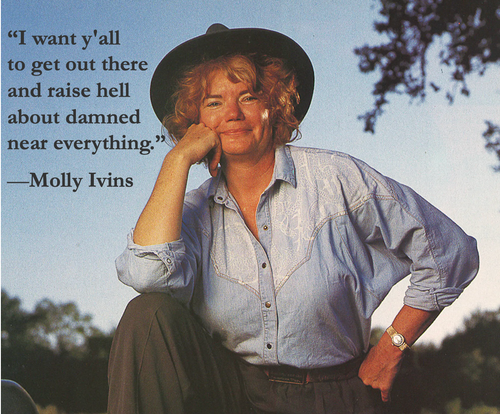
Gurus, whether religious or political, are particularly to be doubted. Take what you need and go—don’t give up your autonomy and your critical judgment, submitting to another human’s theories.
Yet another aside: Something struck me along the way of writing this—My parents met in a shorthand class. That was a fast means of taking dictation, writing down what a boss was dictating—dictating—so you could go away and type it up for him (and it was always a “him”). It was a way to survive the Depression, when people were literally starving, but those two scared people went on to take dictation all their lives, always submitting to authority, obeying their “superiors.” And this kid of theirs runs around saying Question Authority. A generational pendulum swing, you might say, from one extreme to the other.
This extremist says, accept responsibility for your own well-being rather than counting on someone else to take care of you, explain the world to you, tell you what’s next, and demand your loyalty to whatever their agenda may be.
Thinking for yourself and trusting those thoughts are foundational for creating a life that’s truly yours.
I’m so sure the emperor has no clothes, I had a ring made as an 80th birthday present from me to me. The design is a bare ass wearing a crown. Not knowing you’re naked and vainly nattering on as if you’re wonderfully garbed is laughable.
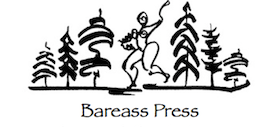
image bareass ring
Choosing to drop your armor and reveal who you are is the other side of that coin. When I told the great editor T George Harris that he was changing an article of mine to be too much about me, he drawled at me, “Oh, just bareass it, Medlock.” Years later, when I finally got the courage to publish my poems, I created Bareass Press.
bareass logo here
Seeing the move you need to make and being able to make it can involve having what my ever-so-blunt New York business partner called “Fuck-you money.” (Don’t tell your mother I said that.) Squirrel away a stash of cash available only to you. It can be your ticket to ride away from situations you shouldn’t tolerate.
If your inner voice says that it’s time to stop or time to go on, that the next word in the poem has to be “mendacity,” or that you need to move to Lima, don't ignore that voice. It may be telling you something important.
6 ~ Does anybody here know how to play this game? Yes. I do. Watch.

Flipping the idea that too many people are just pretending to know stuff, when you do know what to do and how to do it, hold to that. Know it and show it. Most people are so eager to believe someone who even seems to know what to do, they will buy into your certainty.
You will, of course, respect and not betray people who align with you. You’re living your life with honor, not bullshitting your way through, not trampling on the lives around you, right?
A learning moment in my life—this will seem trivial, but I’ve applied the lesson to serious matters and it’s really helped…
It’s 1955 and I’m living in a beach house on the outskirts of Kobe, Japan, in an area that’s full of foreigners. I’ve never lived out of the U.S. before, I’m figuring out how the consular service works, I’m ill at ease, foundering. At a party hosted by a British neighbor, I’m observing a room full of awesomely sophisticated people from all over the world, chatting while downing martinis and apéritifs. Latecomers enter the room, the new French consul and his wife, just arrived from Paris. The room almost seems to go into freeze-frame. Everyone is suddenly oriented toward this Parisienne, a reaction she clearly expects. I see that her dark blonde hair is streaked, she’s wearing frosted lipstick and pointed shoes—all new, to everyone there. It’s 1955. But the key thing is she carries herself like the queen of the universe. Her head is up, her gaze is direct, her movements sure. She’s awesome. I really look at her and realize that she’s not standardly attractive; she’s what the French call jolie laide, roughly translated as “beautiful though ugly.” It doesn’t matter that her features are off. Her presence is on. She is rocking that room.
I’ve thought of her when I cross a stage to a microphone, meet with a potential donor, walk into any room full of strangers. To hell with diffidence. I stride in. My head’s up. I am there.
7 ~ It’s better not to wait for perfection, in situations, or in yourself.
I believe in taking action without waiting to know everything you could possibly know. The complete information about most things will never be available to you.
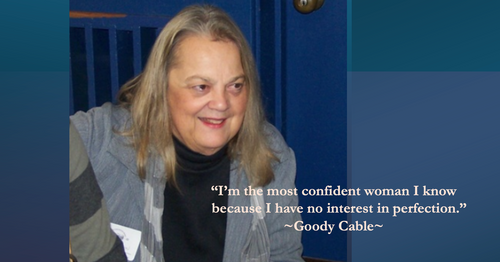
I met Goody Cable when Marilyn Ferguson (author of The Aquarian Conspiracy) assembled a lot of people who had created odd things; Ferguson was writing a book about what made us tick. When she interviewed each of us, in the assembled group of "subjects," Goody’s lack of interest in perfection blew me away. I started talking to her then and we haven't stopped, decades later.
She knows that way too many good ideas never make it to reality, stopped by the creators’ need for perfection. Better to forge on and get something done and real, like her own creations, the Rimsky-Korsakoffee House and the Sylvia Beach Hotel.
Waiting to achieve some level of spiritual perfection will also stop you from taking action. Because nobody gets there. Your imperfect self needs to take that next shot.
A great illustration of that one happened at St. John the Divine in New York, when I was listening to some very sweet people talk about working on oneself as the way to achieve world peace. One of the listeners was an activist rabbi who just couldn’t bear it and jumped up to say that missiles were going into place all over Europe, that people across the world were being starved, enslaved, eradicated, and the speakers wanted us all to meditate more before doing something? The speakers brushed him off; I went to him immediately at the break to tell him that at least one imperfect person there agreed and would keep making noise, keep petitioning, keep marching.
The Greeks have a word for endless belly-button staring—omphaloskepsis. There are also the English words “procrastination,” “terminal timidity,” and even “cowardice.” Perfecting your soul before acting can be a great dodge for people who aren’t brave enough to engage with the world, ever.
image belly button
Don’t be an omphaloskeptic, kid, and don’t be a thinker of great thoughts who does nothing with them. Espousing good ideas and making no moves to put them into action is unspeakably lame. Mama don’ ‘llow that in this here clan.
You’ll also never be sure, in advance, of what the effects of your actions will be. The effects throughout time and space are and always will be beyond your ken. The future is unknowable so you can’t be stymied by all the possible consequences of every decision you make. Just make the best choice you can, based on the givens you have, and the principles you live by.
If you’re saying Yes, welcoming what comes, and making your best moves, something strange happens. Phones ring, doors open, people step up to work with you, things you reach for come into your hands. I suspect this has something to do with your being aligned with The Field. More on that in Bread Crumbs 15 and 16.
8 ~ Balancing kindness, forgiveness, and justice can be gnarly.
There’s a maxim for living that I find as hard as loving your fate. The Dalai Lama said, “Be kind whenever possible.” Well sure, that’s fine, you sweet man. But there’s a second sentence to the quote: “It is always possible.”
Damn. I try. I fail a lot. Just as I fail at loving my fate, and at forgiveness, despite knowing that people are what they are, do what they do, that carrying grudges just weighs you down.
I also know that forgiveness is about more than lightening your personal load. Revenge-seekers have caused havoc and misery across the world, throughout time. The greater good demands that we cut the crap, see that we’re all in this together, and that we all screw up.
On the other hand, it’s not a good idea to forget the bad stuff people have done. Don’t walk back into harm’s way and, even more importantly, do make sure that the malefactors don’t cause more harm. Belling the cat is vital to making sure it can’t sneak up on a new victim. That’s another hard one if you want to avoid conflict, but justice may have to precede the peace of forgiveness.
The lessons of Nuremberg are hugely important. There, Nazi war criminals were tried for what they had done, and their excuse of “just following orders” was completely rejected. Justice was served, and a precedent established, a warning to participants in subsequent conflicts—when you get an order that’s unconscionable, you must refuse it.
Some things, some people, you may not be able to forgive. On a somewhat lesser level than war crimes, I forgave a woman who did me great harm, but I have not forgiven the man who almost did me in. Even after writing a whole book (the roman à clef again) belling that cat, I’ve only made it to pitying him, not to forgiveness.

There’s a Hindu story about a god advising a warrior king to kill some really bad guys, for the good of the people. The advice was along the lines of “They’re doing a lot of harm in this lifetime so you have to dispatch them. Maybe they’ll be better people next time around.”
Believing in re-incarnation has its good points. If I were sure that system worked, I might have run that guy down with my car. To be sure he did no more harm in this life. To not let him acquire any more bad karma this time around. You know—being kind, always.
9 ~ Don’t be so sure you know what’s going on.
One of the reasons I say that is that I’m quite sure that men and women are not the same. Make that no one is the same as anyone else. People of other genders, ages, cultures, and countries have experiences, skills, attitudes, knowledge, programming, and/or feelings unlike yours. Even people who seem completely familiar to you can be wired to see the world in ways you don’t. Assuming their perceptions and reactions are the same as yours can get you into all kinds of wrong places.
Be a keen observer always, a judge rarely. (Laughing. That may be the most Polonius-sounding thing here. So far.)
An observation is “That guy has green hair.” A judgment is “Why the hell would anyone do that to his hair? That’s a stupid, ugly thing to do. He’s probably a stupid, ugly person etc. etc. etc.”
Observing can keep you fully present and making your best moves. Judgment can be a lead-in to being contemptuous. And feeling contempt for people, condescending to them, can wear you out, isolate you, and make you a general pain-in-the-ass to be around.
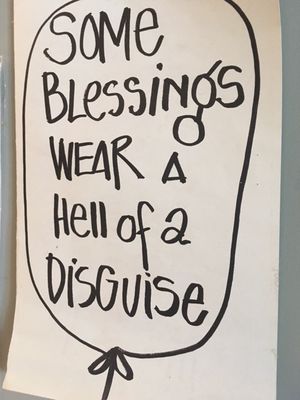
Don’t be so sure what’s happening is bad. Or good. This reminder has been on my wall for years because it’s such an accurate comment on my life, so far.
You just can’t know whether what’s going on at the moment is going to turn out to be good or bad. Long range, your worst experiences might be paving the way for wonders that can only come to you because of the worst ones.
Illustration: I’ve had gut problems all my life. So did my mom. Not good. A grandchild has Crohn’s, a gut disease. Not good. And her disease caused her dad to reach out to me, looking for family history that might help her doctors better understand her condition. I had given him up for adoption, and met him for the first time on his 50th birthday, following up on these inquiries about family genetics. If my mom and his daughter and I hadn’t had not-good gut problems, he and his wife and daughters and sons-in-law and grandchildren would not now be fully engaged members of this clan, embraced and enfolded into everything we do. And that is gloriously good.
You just never know.
12 ~ Riding up alongside people is more persuasive than crashing into them.
In dealing with the people you meet along the way, ride up alongside them. Moving along with them, listening, you can understand where they are. From there, you can say whatever you have to offer that could move them in the direction you’re going, if that’s what you want. You can actually get them to course-correct without ever having to challenge them.
Sneaky? Not if you do it without deception, listening respectfully and then figuring out how to communicate honestly about your own ideas and how they might share any part of them.
It sure beats the hell out of crashing into people yelling that they’re wrong and you’re right. For some reason, that rarely gets anyone to change course. Riding alongside won’t always work, but it’s for sure the best beginning.
[image RBG]
“Fight for the things you care about but do it in a way that will lead others to join you.”—RBG
When there’s no way you’re ever going to get the people in question to agree with you—and they’re dangerous—there’s Eppur si muove. That’s what Galileo said when he survived the Inquisition. The Inquisitors said the Earth was the unmoving center of the universe. Galileo knew that it rotates around the Sun. He could keep saying that and die a gruesome death, or he could take it back, promise to never say it again, and live. He chose to live. And as he left his trial, heading home, alive, to keep working, secretly getting that work out to the world, he muttered Eppur si muove—And still it moves. In the face of overwhelming power, he did something yin, something recognizable to every woman who has ever pacified a dangerous male with “Yes, dear, you’re absolutely right,” while certain that he’s full of shit. It’s called living to get back to your work.
When communicating with people, don’t open with a statement that’s all about you. Begin with I/thou. The first words you say or write should include the person who’s listening or reading. Why are you telling them something? Why should they listen or read what you’re about to tell them?
A favorite illustration of this one is the composer/guitarist who asked me for a consult on how to market a recording she’d made of lullabies. Her draft album copy began with her degrees in musicology, qualifying her to compose this music. My response—Your market is people whose kids have been crying for three days. They’re desperate to get some sleep themselves. You’ve got this music that can help. Start there.
A subset of this one: You have one reader, one listener, one viewer, unless you’re on a stage in front of a live audience. Here in the online world, or in a letter, a book, an email, or a one-on-one phone call, stay singular. “All of you” is off-putting when it’s just me, reading you or listening to you. What—you think there’s a crowd here at my desk?

13 ~ Exercise. And go easy on the junk food.
Your body needs to do what you need it to do, when you need it to do it, and if you ignore it, it will fail you. Look at your health as a long-term investment. From here, at this point in a life, I can tell you that you could be in that body for about 90 years and someday, far into those decades, how it works—or doesn’t—will be important to you.
Sub point: The sun is not your friend. The sail-boaters, horse-riders, and swimmers I grew up with look like ancient sea captains now—the ones who haven’t died of melanomas. Better to hang out in loggias than on beaches.
14 ~ Laughter may be an option.
A lot of things that aren’t good have a daft side you can choose to see. Forgot something—for the fifth time? Your kid finds a way to turn something you said inside out? The lights go out when you’ve got one more page to read? Not the end of the world. Just more bizarre stuff to deal with. It may be better to laugh than have a hissy fit.
15 ~ Meditation works.
I don’t mean thinking deep thoughts about life—that’s contemplation. I mean formal meditation, turning the mind off. It’s a practical form of emotional housecleaning that can lighten your daily load significantly and keep you present to what’s going on in your life, instead of getting mired in regretting the past or worrying about the future.
Meditation helps you Be Here Now, in the immortal words of Richard Alpert aka Ram Dass or, as his dad called him, Rum Dum. Funny, smart, kind man, and a longtime fan of Giraffe Heroes. He always made me smile, in person and in his writings, as in his report that when he had a near fatal stroke, he didn’t have a single spiritual thought. “I flunked dying.” You gotta love that.
Being here now is described in a gorgeous scene written by Thornton Wilder in Our Town, a play that’s been done by every amateur group in the world. Yes, the play assumes it speaks of all humanity while observing a small town full of white Americans. I know, I know. Nevertheless, there’s some good stuff in it, especially in the scene in which Emily, a young woman who has died, is given the chance to observe one day in the life she’s left behind. As she watches a simple day play out, she’s astonished by its beauty, and by how unaware her family members are of that beauty. She asks "Does anyone ever realize life while they live it … every, every minute?” The answer is "No. Saints and poets maybe...they do some.”
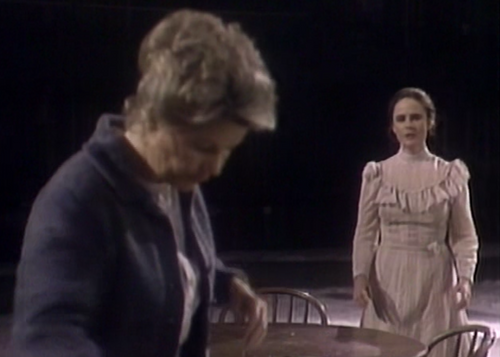
If you realize life while you live it, every every minute, you’ll see the beauty that surrounds you in the natural world, you’ll hear and understand the words being said to you, the expressions on the faces around you, the meaning of people’s gestures. You’ll know the wonder of even the smallest things. And you’ll never be bored.
Never being bored—how’s that for a great idea?
Again, do not get stuck in meditating. It’s a tool for living, not a life. Unless you’re going full cave-dwelling monk, sending white light out to the world is not a career. You’re not an omphaloskeptic, so that good rabbi doesn’t have to yell at you to get off your butt and into action, right?
A favorite meditation story… I once interviewed Maharishi Mahesh Yogi in Fiuggi, Italy. He’d just given a talk in which he said one of the best things I ever heard. It was later expunged from all records of his teachings because his advisers were afraid it was offensive, so you won’t find it anywhere online, but I heard him and I’m telling you. To paraphrase (I wasn’t recording) he said…
- The trouble with most religions is that they tell you to be good
- and then you will get to see God.
- It is very hard to be good.
- When you meditate, you see God.
-
It is then quite easy to be good.
In the questions that followed, someone asked him about being good at something bad. “What if a thief meditates? He could become a better thief.” Amused smile from the guru and this reply: “A thief who meditates will no longer be a thief.”
Got that? No drawn out battles with inner demons. Enough with the sturm und drang. Just run this mantra silently twice a day and go live your life, no fighting your way up a long path to the Pearly Gates where you’ll finally be happy. If you get in.
When I told him it was one of the best things I’d ever heard, he seemed delighted, though his staff was not at all.
It’s important to tell you that the God one sees in meditation isn’t an old dude in the sky. It’s an experience of being in and of a consciousness that includes all living things, all in there with not-separate you, all connected, and all beneficent. You’re in the Field, where you are limitless.
There’s no way to think yourself there. You know that Descartes thing, “I think, therefore, I am”? (And if you haven’t encountered Descartes, go look him up. Now.) Yes, as long as you’re thinking, you’re definitely you, finite you, one being, thinking. When meditation takes you beyond thinking, the walls of self-consciousness fall away and you experience being a helluva lot more than wee you.
A caveat—not every meditation session gets you there. A lot of the time, you may just fall asleep, which is actually not a bad thing since it probably means you needed to rest. But every once in a while, you’ll get through—or in, or out, or whatever preposition can sort of describe getting to a place that already surrounds you in every direction.
16 ~ Truth and beauty are in and from the Field.
I think the Field is true because I’ve been there, as have vast numbers of others whose descriptions jibe with mine. It’s Exhibit A in an “Evidence Project” I’ve been half-assedly tinkering with for some years now, looking for things that signify an order at work behind what may seem random chaos.
Chris Alexander wrote four enormous illustrated volumes called The Nature of Order, describing his belief that there is indeed Order and that it’s operating through us when we create anything that’s deeply beautiful. I think he—and other seekers—were telling us about the Field, about the resonance we feel when we connect with it, about the joy we feel, and the beauty we create when we get out of the way and let it flow through us and into our world.

Exhibit B is Phi, 1.618, the ratio for the perfect spiral. It’s in galaxies, it’s in our DNA, and no fallible human made it up. If you see something that registers with you as beautiful, you’re probably looking at Phi. It’s all around us, and in us, and attracts us with its beauty. Phi is everywhere, a manifestation of the life force that is the Field, evidence of the Field’s existence, beauty, and order.
Phi isn’t something we made, it’s not about us, and isn’t there for our discovery, appreciation or benefit. I mean, tornadoes and hurricanes are gorgeous spirals and they’re pretty bad news for humans. No. Phi just is.
I’ve figured for a long time that I must be an Animist, which was fitting; I’ve got the Celtic DNA to go with my perceptions of what’s going on, and those blue-painted ancestors were pretty strong Animists. In the process of writing this, I got it that I may actually be a Panentheist, that being closer to what you experience when you tap into the Field. It’s “the belief that the divine pervades and interpenetrates every part of the universe and also extends beyond space and time.” Yeah. There’s nothing that isn’t “God.” That sounds about right to me.
Assumptions about humans’ place in the order of things are core to humanity’s survival. We don’t have dominion here in this realm where Phi and meditation give us those glimpses into the Field; we don’t even have stewardship. We’re still figuring out what’s going on. We’re subject to the same rules as every other life form here. The Field rules.
Do look further into that idea—see first the writings of Daniel Quinn, starting with Ishmael. I worked with him at a publishing house in Chicago and had no idea what was going on in his head, which was an array of brilliant perceptions about what’s really going on in the world. Somewhat beyond “Did the proofs come in on that sociology book?” and “This has to be in the morning mail. It’s pizza at our desks tonight.” It was way more interesting to talk with him in his independent-thinker mode, both of us hanging out at Goody Cable’s Sylvia Beach Hotel on the Oregon coast.

I got more on the Field a couple of years ago when I finally made it to the Alhambra, in Granada, a place I’d wanted to see since researching Islamic architecture for a speech I was writing for the Aga Khan. I wasn’t sure why it felt so important to go there—it just was.
Moving at last through the astonishing forms and designs of that ancient place, I was listening to a young Spaniard who didn’t do guidebook recitations, bless him, he just talked about each amazing thing the Moors created. At one point, he said, “Flowers, stars, rivers, trees, the words of poets, all intertwined because it’s all one and it’s all God. They knew.”
My name for “it” wouldn’t be “God,” but hearing those words, I knew why I’d come there. The Moors understood existence. It’s all intertwined, all one, and it’s all sacred, the life force in everything, and beyond everything.
When Joseph Campbell was pretty old (not as old as I am now) I spent some good time with him and asked him what he understood personally about what’s going on, after all his years of studying human attempts to understand our existence. His answer led to this poem.
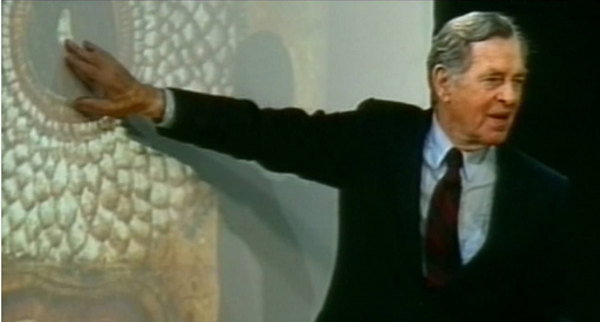
- JOSEPH CAMPBELL’S POCKETS
- What do you know, Joe,
- after all that study, all that tracking
- of humanity’s search for the sacred,
- for import, for course coordinates?
- A veritable Harpo of revelations
- he pulls from a shirt pocket “Natural Music”
- and tells us that Jeffers got it right:
- to be holy is to be strong enough to hear
- beauty in the world’s storms and rages
- without divisions of desire and terror.
- A back pants pocket yields a wallet
- and a tiny newsprint clipping
- in which a Honolulu cop has,
- on sight, proffered his life to save a stranger.
- Unconditionally living in unity, namaste incarnate,
- dwelling always in the field of chi,
- feeling it pulsing through
- us, it, them, that, no divisions, no judgments, no fear—
- all the great scholar’s learning distilled in a few lines,
- plain, clear, and enragingly, divisively, terrifyingly—
- hard.
- Have you another nugget, Joe,
- perhaps an easier one,
- in some other pocket?
So. There is nothing that isn’t God, even the stuff that repels or scares you.
A note on the Honolulu cop—the clipping described him leaping from his patrol car and lunging for the jumper just as the man went over the railing, the cop almost being pulled over himself. The cop said he knew the jumper wasn’t separate from himself. He had to save him. No question about it.

If you can’t imagine doing what the cop did, consider this. You’re walking along a city sidewalk and you see a guy coming toward you, lurching, dirty, maybe drunk or sick. You give him some clearance and keep going, getting safely away from him. But. If you don’t see him coming, if you just see a body starting to fall right as it passes you—your arm will shoot out. It will. Because a fellow being is in trouble and we’re wired to help, instinctively. If you’ve got time to rationalize all the reasons you need to stay clear of him, that instinct is over-ridden by fear. But the wiring is still there, under all that learned caution.
Have you ever been in a hospital’s newborn nursery? If one of the infants starts to cry, the others take it up. They may not be hungry or hurting, but somebody is, and they sound the alarm. Those new arrivals from the Field are still connected.
Exhibit C in the Evidence Project is intuition. There are constant small manifestations of our connectedness to each other and to the Field in the many reports of people knowing things they have no logical reason to know. It’s pretty common to know who’s about to call. There are closely related people who know when something’s gone wrong, no matter how far apart they may be.
Have you ever seen something in a dream only to wake up and find it had just happened, in the real world? I have, to my astonishment. Like dreaming that a fellow committee member had left a meeting room with great finality and seriousness, and hearing in the morning that he had died that night.
We call these things “intuition,” and we don’t have a scientific explanation of what intuition is. Yet. We just keep experiencing that there is indeed connection, a unity, between our individual selves and other life forms, even sometimes with the inanimate.
Exhibit D is “natural” talents. They fall into that realm of things we humans haven’t yet figured out about the nature and extent of consciousness. It’s where physics and psychology and brain research tend to stop, the scientists unable to explain what consciousness may be.
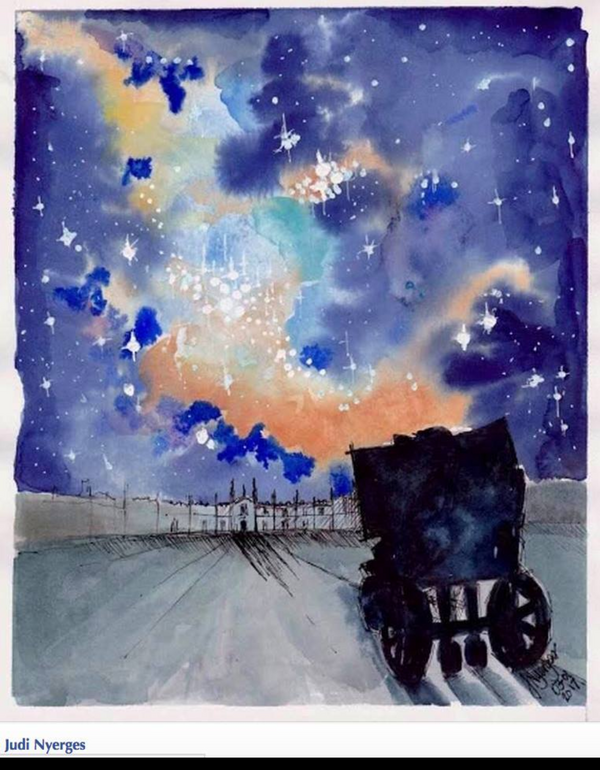
“Not only does God play dice but... he sometimes throws them where they cannot be seen.”—Physicist Stephen Hawking
There are people who know stuff they’ve never learned—in this lifetime. I had a peek at that when I did some theater work. I knew how to move on a stage, how to project my voice, read a line. It happened again when I ventured into painting, knees knocking, sure I was out of my depth. There was the model and the canvas, brushes and paints, and I started doing, without instruction, what seemed right to do. Seemed. With no idea why. The ace painter-instructor just said, “Well, you’ve got all the chops,” and left to help the beginners.
Writing, for me, has most often been writing down what I hear. Sometimes broad concepts, sometimes snippets, phrases. Sounds schizophrenic, I know, but so far the voice has been friendly and hasn’t urged me to take up arms against Martian invaders. I make a lot of notes about what I hear. There are pads and pencils everywhere in my world, including in the car. They’re all followed by actual work—research, drafting, editing—but the writing itself keeps being a form of transcribing. Hands in motion, the next needed words move from ears to page.
None of this makes sense to me. Unless the Field is real.
You’ve heard talent described as “God-given,” I’m sure. I see talent as evidence that something’s going on, though I’m not calling the source of such gifts “God.” I think those gifts are coming in from the Field, the consciousness of living beings connecting to consciousnesses that have rejoined the Field and are no longer in living bodies. That’s me making one of those fallible, human guesses, a guess based on the experience of transcribing words that are just handed to me, so to speak.
Whose consciousness is my consciousness hearing when I write? I think I’m hearing writers from other times whose thoughts are held in the Field, where some of us who are in bodies now can, from time to time, listen in.
17 ~ Having it all, doing it all, doesn’t work. Choose.
Dealing, in this life, with those messages, I made some choices. It would have taken years of work to be really good at acting or painting, and I chose to put the time into writing instead. I still sketch a face from time to time, because it’s fun, but I haven’t dabbled in theater. The last thing I want to do is pretend to be someone other than myself—it took too long to arrive at me. I would hate to be an instrument now, manifesting the ideas of writers and directors, shaping myself at auditions into whatever others wanted me to be, hanging on their decisions to know if I had work. The lack of autonomy in an actor’s life would do me in.
Writing was far from autonomous as long as I was writing ad copy, annual reports, marketing brochures, and other people’s speeches, columns and autobiographies. Ghosting paid the bills—I was sure I had nothing to say in the first almost five decades of my life. When I finally got it that I had a lot to say, there was no time to waste as a ghost. Since then, writing has been my best chance of putting it all together.
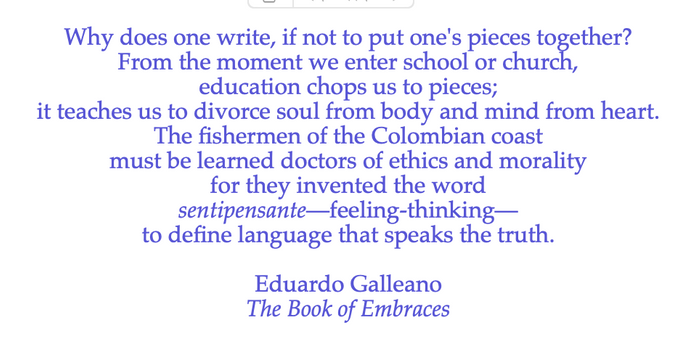
The years since 50 have been about quietly writing, getting better at it—but not by going back for an MFA, which has become a Thing for writers. I hate the idea that this work has to be credentialed. I just hear words, see images that need to be described, and I write it all down, creating articles, speeches, profiles, poems, stories, a novel—and more is streaming in every incredible day.
Because I think the Field is sacred, I’ve called artists my clergy, but only the ones who really blow you away, creating things you recognize as strong and true and beautiful. They’ve connected to the Field, I’m sure (because I’m one of those imaginative humans, trying to figure out what’s going on). That massive consciousness is roaring through them and into our visible world, its source labeled the Muse.
I’m sure that Chris Alexander was plugging into the Field when we built this house. A bit shorter than his four volumes defining the process, my poem “Clergy” said he’d been listening to God. He liked that so much, he put the poem into The Nature of Order, and on his website.
- Alexander sculpts a building
- out of air and wisdom,
- waving his hands,
- squinting his eyes
- to see what only he and God can see
- in this clearing on the ridge.
- Listening to something
- we cannot hear, he brings into being
- a house so solid, silent and calm,
- so embracing, consoling and inevitable,
- that it draws in and restores
- every open soul that finds its way here.
- And many do.
- Pilgrims who have heard,
- who’ve seen a photograph,
- who sense that here there is something
- mysterious, rare, perhaps even inspired.
- On a clear blue afternoon
- we sit at a long table in the sun,
- the house embracing this garden
- and all of us who bask here
- amid the calendulas and ferns.
- Feasting on tabouli and cold birds,
- we talk of poetry and paintings,
- of terraces in Tuscany and homemade wine,
- of our work, our passions, our quests.
- We are friends, gathered here
- by the grace that emanates from this holy place.
- At Christmas, the clan assembles.
- The tree, dressed in familiar ornaments,
- touches the coffered ceiling
- and sends the scent of balsam to mingle
- with fire, roast and cakes.
- Thick walls hold out the cold, the wind,
- and every danger of the world we know.
- Comets cut across the high windows
- as we are drawn in and held fast, together,
- blessed by the house that Alexander made,
- while listening to God.
18 ~ Where are we, and where do we go from wherever this is?
I watched my mom face death when she was the age I am as I post this. She was sure she was headed for heaven, as herself, and that her beloved sisters and mother would be there, themselves, welcoming her. Jesus, too. She wasn’t scared, was rather looking forward to it. Witnessing this, I was grateful that humans have created religions. The main offering of most of them is an assurance that we really won’t die, instead going on forever. In a much better place. If we’ve been good and therefore qualify.
We know we have to die and it’s too awful to think that’s just the end of everything. There must be something else, there must be a reward for the good we’ve done—and punishment for our enemies, who will not be with us in heaven. That’s a wonderful construct that can get us through hard times with the satisfying thought that there will be a reckoning. (I can hear my toddlers demanding justice, yelling “That’s not fair!”) Believing we’ll live on can ease us into facing death with calm anticipation rather than freaking out when we even think about it.
A cherished friend in New York told me that she definitely believes she’ll be with the loved ones she’s lost to death, because it makes her happy and it means she doesn’t have to be scared about dying. And, if it turns out not to be true, “It won’t matter because I’ll be dead.” That’s a delightful and eminently practical way to deal with the Ultimate Question.
I’d like to believe it too, because it’s lovely and comforting, but I don’t. My focus in these personal end times is on finishing my work as Ann, before I stop being this thinking, breathing individual, separate from the Field.
I suspect that though consciousness continues after physical form ends, we don’t have an afterlife as our individual personalities, but as those elements of consciousness that can reach out to living beings, maybe people trying out an unfamiliar work.
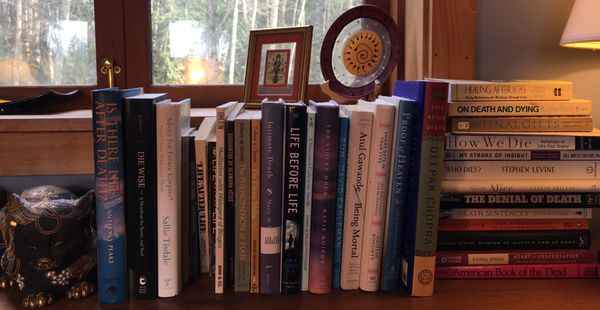
There’s a whole shelf of books here about death and what may come next, a collection of ideas people have come up with. I read them all because I do want an idea of how it works before I experience it, and time’s wing-ed chariot is gaining on me.
There’s some wonderful stuff there, fine speculating. After reading them, the one thing that’s stuck with me was by good old Marcus Aurelius. He pointed out that death only costs us the moment we’re in. We’ve completed the past, the future doesn’t exist—so all that’s lost is the moment. That made me laugh out loud. And there’s no speculation involved, no guessing. It’s just an obvious observation, one I‘d never made myself. Duh.
Something may survive other than the work I’m leaving behind, but I don’t think that something will be “Ann Medlock.” Yeah, I’m making a pretty strong guess that the consciousness that animated this one human will be un-embodied, in the Field, where it’s all one and it’s all sacred, where things that I’ve learned can be tapped into by embodied beings, giving them ideas, images, words that they could use to do as much good as they possibly can, in whatever time they have in living form.
This one imaginative human’s Biggest Guess is that Consciousness is the Force and the Field, that one indestructible omnipresence that encompasses you, me, them, it, that, this, now, then, here, there—everything and everywhere in time and space. Consciousness, like gravity, unexplained by science (so far) is all of it.
What if the Field is beneficent beauty and peace, where the consciousness that has been here as You lets go, at death, of all illusions of separation, and is simply reabsorbed into the place it was before differentiating to become You?
I’ve decided to align with known science—and with rockabillies. Physicists are sure that mass can neither be created nor destroyed, “although it may be rearranged in space, or the entities associated with it may be changed in form.” I read that and laughed, hearing rockabilly Janis Martin growling out “It’ll Be Me.”
- If you hear a thought calling out in the night
- If you see somebody hanging from a lamp post bright
- Baby, it'll be me and I'll be looking for you
- Well, if you see somebody looking in all the cars
- If you see a rocket ship on its way to Mars
- Baby, it'll be me and I'll be looking for you
I think that better be played at my wake, in her wonderful whiskey-and-cigarettes voice. Nothing is created, nothing is destroyed, so nothing’s gone. I’ll just be rearranged in space, changed in form, back in the Field. Maybe as a thought calling out in the night.
Physicists are also sure that everything began with the Big Bang, so that means we started as stardust, that we’ve been rearranged, changed in form, again and again, and that we always will be. That grim “dust to dust” warning in Christianity isn’t as grim when you know it’s stardust, from somewhere in the spiraled universe.

I know where I’m [sic] going. Sort of.
I close this hoping you’ll move wisely and often joyfully through the dark forest, tracking these bread crumbs—or not.
Whatever comes to pass, here’s to you, kid. May you connect seamlessly and often with the Field, as you make the path of your one wild and precious life, here, now, and in all the places and days ahead of you.
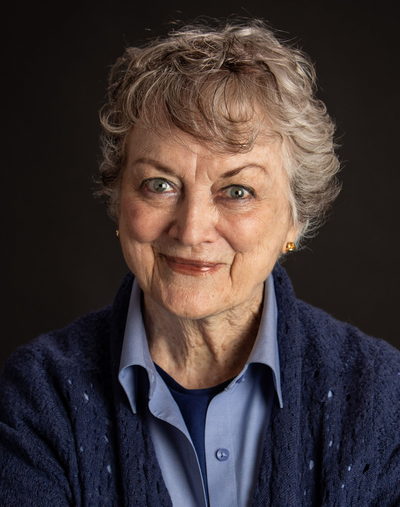
- With love, Ann Medlock
- At 89 years... and counting
